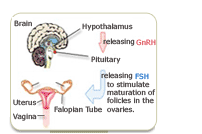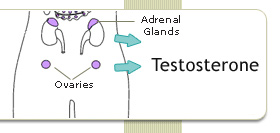34 MENOPAUSE SYMPTOMS |
HEALTH CENTER |
|
| |
|
|
|
|
|
|
Testosterone hormones are of vital importance to a woman's health. When testosterone levels fall after menopause, most women will experience several physical and psychological symptoms of varying intensity. Keep reading to learn more about testosterone, its effects in the body, and the consequences of fluctuating testosterone levels. |
|
|
Testosterone - Brief Explanation
Testosterone is an androgen (male) steroid hormone. Testosterone is responsible for the male secondary sex characteristics, but the hormone is also produced in low amounts by women, and plays an important role in various bodily systems. In women, testosterone is converted from cholesterol by the ovaries and adrenal glands.  Testosterone - Effects
Testosterone - Effects
In conjunction with estrogen and progesterone, testosterone hormones play an essential role in women's health. Testosterone's most important function in women is that of a precursor to estrogen hormones, but the hormone also affects several other areas of the body, including the muscles and bones. Testosterone promotes muscle growth and strength, and also helps to preserve bone density.  Testosterone - Fluctuation
Testosterone - Fluctuation
In the years leading up to and following menopause, women will experience significantly decreased levels of testosterone. By the time a woman is postmenopausal, her testosterone levels will be thirty to fifty percent lower than premenopausal levels. This decline will result in symptoms including loss of libido, depression, and bone loss.  |
|
| |
|

|
|
Testosterone possible trigger for depression |
|
Although testosterone is typically thought of as a male hormone, the hormone also plays an essential role in women's health. However, augmented levels of testosterone in women can result in serious physical and psychological conditions, including mood disorders like depression. |
|
|
| |
| |
| |
|
|
Testosterone - Treatments
Deficient levels of testosterone can seriously affect several aspects of woman's health. Fortunately, there are various methods for menopausal and postmenopausal women to both cope with the physical and psychological symptoms of declining testosterone levels, and declining hormone production itself.  |
|
Falling testosterone levels are an inevitable part of aging, but there are treatment options that can help to stabilize hormonal levels. Keep reading to learn about the most effective treatments for testosterone deficiency, including lifestyle changes, alternative treatments, and medical procedures.
|
|
|
|
|
Treating Testosterone Deficiency with
MacaActive Supplements |
|
Testosterone hormones play an essential role in several areas of the body, and as hormonal levels decline with age, the health implications can be significant. As women begin to notice the symptoms of testosterone deficiency, they may want to consider taking steps to stabilize their hormonal production.
Today, there are three effective ways to normalize hormonal levels: lifestyle changes, alternative medicine and drugs & surgery.
|
|
 |
Lifestyle Changes: Lifestyle changes (such as an improved diet and increased exercise) are vital for overall health and for alleviating the symptoms of hormonal balance, but lifestyle changes alone will not have a significant impact on hormonal production. Most women will want to consider the next level of treatment, alternative medicine, which has proven to be excellent for treating testosterone deficiency in a safe and natural way.
|
|
 |
Alternative medicine: There are two types of herbal supplements for improving low hormonal levels: those containing phytoestrogenic herbs, and those containing non-estrogenic herbs. Phytoestrogenic herbs (like Black Cohosh) are filled with phytoestrogens, which are similar to estrogens. They can increase low estrogen levels by replacing some of the missing estrogen hormones. This isn't the best solution, however, because your body will become less responsive to producing estrogen on its own, causing a further decrease in body-own hormone levels. Unlike phytoestrogenic herbs, non-estrogenic herbs don't contain estrogen, but they nourish the hormonal glands to work more efficiently. This ultimately results in balancing not only estrogen, but other necessary hormones, as well, including testosterone. Using non-estrogenic herbs is one of the safest and best ways to treat hormonal imbalance naturally.
An excellent example of a safe and effective non-estrogenic herb for testosterone deficiency is herbal MacaActive. What makes MacaActive so special is its ability to balance hormonal levels in women by nourishing the hormonal glands. In this way, it alleviates most disorders related to hormonal imbalance.  to read more about MacaActive.
|
|
 |
Drugs and Surgery: This level of treatment has the highest risk and often the highest cost. The most common drug therapy for treating hot flashes in the US is hormone replacement therapy (HRT). There's no doubt that this is the quickest and strongest way to combat hormonal imbalance. Unfortunately, it entails serious side effects and increases the risk of different types of cancer in women. If you still want to consider this approach, see your doctor to learn more about what this treatment option involves.
|
|
A safe way for balancing hormones:
Non-estrogenic herbs are the most effective solution for treating testosterone deficiency.
MacaActive is an excellent non-estrogenic herb. It's simple: rather than putting hormones from the outside into your body artificially, MacaActive stimulates your hormone glands into producing the necessary hormones naturally. This is what makes MacaActive supplements so unique.  to read all about MacaActive. |
 |
|
|
|
|






